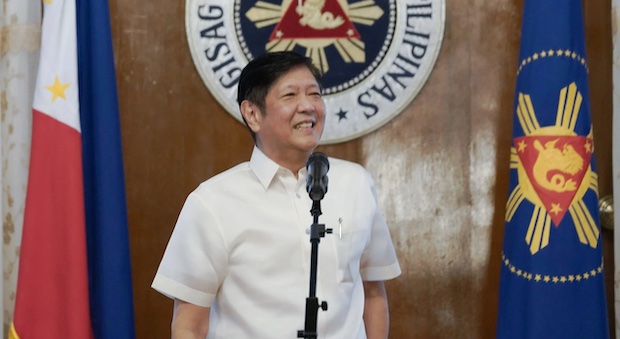Marcos Jr. orders revision of scientific career system IRR

President Ferdinand Marcos Jr. (MALACAÑANG FILE PHOTO)
MANILA, Philippines — President Ferdinand “Bongbong” Marcos Jr. has issued an executive order revising the implementing rules and regulations (IRR) of the scientific career system under a previous presidential order.
The Presidential Communications Office (PCO) on Wednesday said Marcos issued Executive Order No. 17, saying there is a need to update the existing IRR of the Scientific Career System (SCS) to effectively respond “to the evolving needs of the country’s science and technology human resources in government service.”
The order, dated Feb. 20, states the SCS will be a system of recruitment, career progression, recognition, and reward of scientists in public service aimed at developing a pool of highly qualified and productive scientific personnel.
The system will be characterized by the entrance to and a career progression or advancement based on qualifications, merit, scientific productivity, career path to scientists, and incentives and rewards to ensure the attraction and retention of highly qualified personnel in the science and technology sector.
The PCO said the system would apply to scientific personnel with master’s and doctorate degrees in sciences who are directly involved in research and development, covering biological sciences, engineering and technology, mathematical and physical sciences, health and agricultural sciences, as well as all scientific disciplines determined by the Scientific Career Council (SCC).
Article continues after this advertisementUnder the order, the SCS’s administration system will be composed of the chairperson of the CSC as ex-officio chairperson, the secretary of the Department of Science and Technology (DOST) as ex-officio co-chairperson, and other ex-officio members.
Article continues after this advertisementThe SCC will establish a technical working group and special technical committees (STCs) to serve as an advisory body and a screening committee.
STCs in different fields of specialization will be created. Each technical committee will be composed of at least five members recognized by authorities in their respective fields and who will serve for two years.
The PCO said the appointments of scientists under SCS would be based on rank, from Scientist 1 to Scientist V, who will be admitted to the system to the extent that they meet the minimum qualifications.
Their pay will be based on a compensation plan, including fringe benefits and reasonable allowances comparable to those of the Career Executive Service (CES).
The PCO said the executive order also calls for a continuing training program for all active scientists.
The SCS secretariat will be funded by the national budget, while scientists from national government agencies, state universities, and colleges will be compensated through their respective appropriations.
Meanwhile, corporate operating budgets will compensate scientists from government-owned or controlled corporations (GOCCs). For those from local government units, their salaries will be charged against their respective local funds under RA No. 7160 of the Local Government Code of 1991.
RELATED STORY:
Marcos: Science and Technology week proof with gov’t help, Filipinos can be world-class